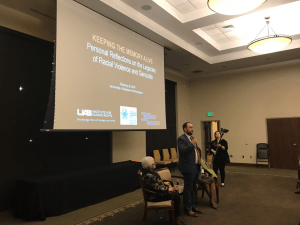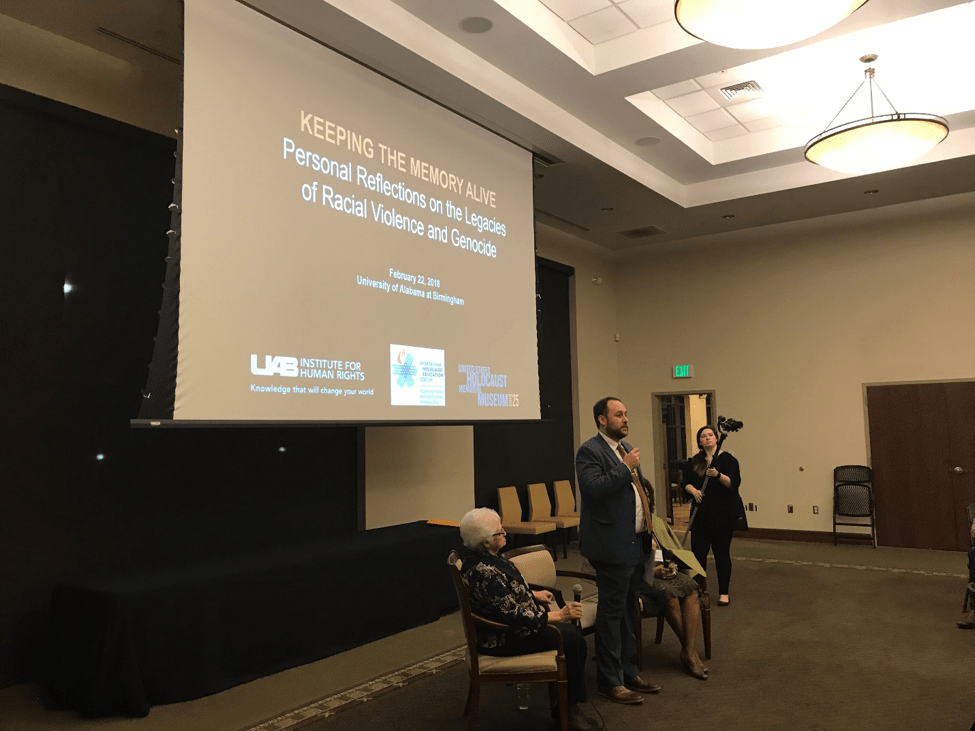On Thursday and Friday, February 22nd and 23rd, the UAB Institute for Human Rights co-hosted a two-day symposium entitled “Bystanders and Complicity in Nazi Germany and the Jim Crow South” alongside the Center for Advanced Holocaust Studies at the US Holocaust Memorial Museum and the Birmingham Holocaust Education Center.
The Symposium was intended to demonstrate the importance of civil society leaders galvanizing the general population to rebuff state-sanctioned racism, antisemitism, and violence. Dialogue brought forth by the symposium showed how, when, and why people supported, complied with, ignored, or resisted racist policies and violent practices in systems of intentional discrimination, oppression, and attacks on the basis of race and ethnicity.
On Thursday night, a panel entitled “Keeping the Memory Alive: Personal reflections on the Legacies of Racial Violence and Genocide” featured two speakers: Riva Hirsch, a Holocaust survivor, and Josephine Bolling McCall, who lost her father during an Alabaman lynching in 1947. This blog post focuses on my personal reflection of the panel and the conversation between the two powerful speakers.
I felt an immediate connection to Riva; she reminded me so much of my grandmother. Riva began by telling the story of how her family went on the run from the Nazis (she was seven years old at the time). It was not difficult to create vivid mental images, as Riva illustrated her story with extreme details. Rita’s horrors of that night continued to progress with the separation from her family and the beating of her mother when she fought to keep the family together.

I tried to think of what my life was like at seven year’s old, and I could not pinpoint a memorable moment of comparable fear and horror. The stark contrast in my and Riva’s experiences as children was upsetting and confusing. It was more difficult to think of what my life would be like if I were forcibly separated from my family at such a young age and painful to think of seeing my mother get beaten.
When Josephine spoke of her father – his characteristics such as being hardworking and selfless – I thought of my grandfather who is the same way. Josephine’s father was murdered when she was five years old. The terrible story of Josephine running to the end of their driveway with her mother and seeing the corpse of her father was heartbreaking. Josephine’s story continued with how her mother reported the murder to the local sheriff, only to have him reply that no justice will be served.
The loss of a loved one can be painfully impactful, and the loss of a parent can be devastating. I was never met with the loss of a loved one until my early teens and it certainly was not at the hands of a murderer. If I had lost a parent when I was younger, the fact that it would be handled effectively and efficiently is a light comfort, but that was not the case for Josephine or her family simply due to the color of their skin. It was incredibly difficult to hear first-hand about the failure of our police force in the pursuit of justice. How easy it was for the sheriff to shrug off the murder of one of his citizens made my skin crawl.

Each story was authentic and emotionally impactful in their own ways. It was a dialogue about suffering, not a comparison on who suffered the most. The stories built off of one another and showed the importance of personal stories when it comes to educating on dense topics.
The final message conveyed by the two speakers was, “Keep talking about it so that love will prosper and hate will lose.” It is important for us to continue the conversations about atrocities that have plagued our societies so that we can gain the necessary means to prevent them from happening again. We are destined to repeat our mistakes if we do not recognize and learn from them. It is our job to confront the denial that these events ever took place, to ensure that they never happen again, and denounce the hate that stems from it.
To see what other events we have coming up, visit our events page here.

